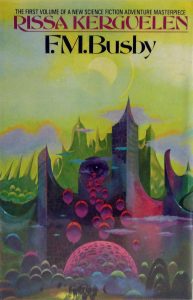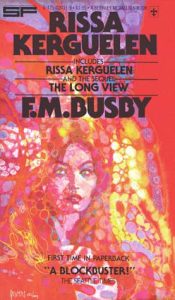Review – Rissa Kerguelen
This is my second time reading this book. Actually, the first time I read it in two parts. The publication history is confusing. Rissa Kerguelen was published in Hardback in 1976. The Long View followed the same year. In 1977, both books were released as a single, 630-page paperback, confusingly also titled Rissa Kerguelen.
In 1984 Berkley publishers split the two volumes into three, releasing mass-market paperbacks Young Rissa, Rissa and Tregare and The Long View. Was this the result of an editorial prejudice against long books? In 1961, such thinking caused the gutting of 60,000 words out of Heinlein’s Stranger in a Strange Land. Some editors thought science fiction fans did not have the attention span to read long books. If only those editors had foreseen the advent of Brandon Sanderson and George R.R. Martin.
Or perhaps the motive was simply financial. Rissa Kerguelen, as originally published, was already handily divided into two “books.” The going rate for a paperback book of less than 200 pages in the 1980s was $2.75 – $2.95, but a 400-page one only justified an extra fifty cents or so. Why make $3.50 when you could make $5.70?
Whatever the reason, when, in 1986, I asked a friend who read more broadly than I for a recommendation of “an author who writes like Heinlein,” she handed me Young Rissa, just half the of the first novel in the series. While I enjoyed it very much, I waited another 17 years to read the second half. I feel the story fares better when both parts are ready together.
F.M. (Francis Marion) Busby began writing fiction at the age of, 50, after more than a decade as a fanzine editor. His zine was Cry of the Nameless, for which he won a Hugo Award.
Clearly, he took to writing fiction. Per Wikipedia, he published 19 novels over the course of the next 23 years. He was also president of the Science Fiction Writers of America (SFWA) for two years. Robert Heinlein’s penultimate novel, The Cat Who Walks Through Walls, was dedicated to him.
Busby quit publishing in 1996, claiming that the IRS and the bookstore chains had caused the death of the midlist novel. (That’s a novel that is not a bestseller, but which makes money.) It’s a complaint many authors have shared, over the years. It may explain why, if you pulled all the Star Trek, Star Wars, graphic novelsand Manga off the bookstore shelves, you’d be left with half a shelf labeled “Science Fiction.”
I picked up this book again via a roundabout route. First, I picked it up in the very nicely kept used book booth at the late Westminster Antique Mall. This sprawling warehouse was once named Baltimore’s Best Antique Mall, but sadly had to close when its last set of owners failed to pay their rent. Bad business decisions hurt more than just the business owners. The town and the whole region lost one of the best antique retailers we had, and a nice used bookstore lost its home. While I owned the paperback, I knew I intended to someday reread it, so I bought the hardback for $10.
Flash-forward a few years, and I’m looking for a new audiobook to listen to while I drive, do yardwork and house, or take walks for fitness. As I mentioned last week, I’m usually consuming about six books at once, and one of them is always on audio. I like to listen to books I’ve already read, if possible. You see, I am a terrible listener. A speaker usually has about three minutes with me, and then, no matter how competent and dynamic said speaker is, or how much I’m enjoying the topic being explored, my mind starts wandering. I wind up missing more than half of what’s said after that.
Even books I enjoy very much, like Diana Gabaldon’s Outlander saga, suffer if I’m first exposed to them via audio. (I began listening to them because I feared I wouldn’t have the patience for such long stories in printed form. In fact, when Go Tell the Bees that I Have Gone came out last Fall, I decided to plunge into the hardcover rather than listen. I’m glad I did. I suffered no impatience whatsoever and will now always read Diana’s fiction rather than listening, if I’m able.)
I generally alternate my listening between non-fiction, historical, and classic science fiction. I also take a couple days out every other month or so and listen to one of the Paperback Library Dark Shadows novels from the late 1960s. They’re horribly formulaic and carry little of the atmosphere of the classic Gothic soap opera, but, read by Kathryn Leigh Scott, they’re still a treat.
So, it was time for science fiction, and I recalled that I had wanted to re-read the first/first two Rissa books. (Yes, I’d bought the hardback to re-read, but I generally buy a paper copy of the book I’m listening to anyway, so I can re-visit passages I missed, or that I want to grab quotes from. Like Thomas Jefferson and readers of his day, I keep a “Commonplace Book.” Well, it’s not a book. It’s an Apple Note. But it’s full of quotes I like from things I read.
I learned that there was a new volume in the Rissa series, published only on Kindle, ten years after Busby’s death; but, much to my surprise, I learned that none of Busby’s catalogue is on Audible or any other platform. I made a mental note to someday contact his estate and ask if they were interested in letting a tired, retired podcaster of note record his works, and I picked something else to listen to. Then I put Rissa on the top of my to-read list.
Rissa Kerguelen is the first of a series with additional tie-in novels following the history of supporting characters. The story begins grippingly, presenting Rissa as a sort of futuristic, female Oliver Twist. She’s the daughter of two intrepid journalists who are killed (read: assassinated) while investigating the activities of one of the large corporations that now control Earth and its colony planets. Although she and her brother have a living uncle, her parents have been declared terrorists, and so the children are forfeit to the government. They are “enrolled” (read: “imprisoned”) in Total Welfare, a program of forced labor controlled by the government, which in turn is controlled by United Energy Transport or UET. Clients of Total Welfare own no property and make very little money at their work. Consequently, most of them seldom leave the program. Rissa does, however. Lottery tickets are bought by the (corrupt) management in the names of all of the clients. Every now and then, one wins. This practice gives hope to the others. Rissa escapes a harsh existence of forced labor and sexual servitude, only to be visited by a friend of her parents who delivers a dose of harsh reality.
The laws of Earth are so arbitrary and capricious that everyone breaks at least one of them on an almost daily basis. Within a few weeks, when her celebrity as a lottery winner has faded, UET agents will arrest her, find her guilty of some crime, sentence her back into Total Welfare and (of course) seize her assets. Her only chance of escape is to drop out of sight with the help of the Hulzein establishment. Erika Hulzein lives in Argentia, and apparently has a penchant for adopting strays. She trains them to be dangerous and useful operatives of her growing business empire. The Hulzeins are despised by UET but too powerful to take down.
Rissa trains as, essentially, a mercenary, and then ships off Earth to stay out of U.E.T.’s clutches, leaving the Hulzeins behind. She goes to live in the Hidden Worlds, the planets where people can live free of UET domination. The locations of these worlds are such a closely held secret that some of them don’t even have names, only numbers. To get to one of these worlds, a passenger must buy a berth on a ship that has Escaped, that is, a UET ship on which the crew has mutinied and become free agents. Her berth to the mysterious planet Number One is in the cabin of Captain Bran Tregare, a notorious pirate. Tregare leaves Rissa—having given as good as she’s gotten from him—on Number One.
Rissa immediately makes a powerful enemy, which, on Number One, means she’s going to be challenged to a death duel. It’s not Rissa’s fault, really. The bureaucrat in question was rude to her, and she held her ground. In the eyes of a petty bureaucrat, that’s an insult; and he means for Rissa to pay in blood. Obviously, she doesn’t or the book would not be named after her.
Over the course of her the story, Rissa reconnects with both the Hulzeins and Tregare—who is a Hulzein, it turns out. In grand Dickensian fashion, she ends the adventure as a member of the powerful dynasty, initiating a science fiction family saga. Robert Heinlein had already done this with his Howard families (Methuselah’s Children and Time Enough for Love had already been published when Rissa took flight.) Heinlein cited John Galsworthy’s Forsyte Saga as his inspiration, and the Hulzeins fit well into that tradition.
The themes explored are typical of science fiction, especially in the mid-1970s. First and foremost, the “Long View” oversees all. Space travel is not given the instantaneous out it enjoys in Star Trek. Traveling at near-light and possibly FTL speeds means the traveler stays young while the people she left behind get older—often much older. Since space travel is such a part of this society, people like the Hulzeins have to take the Long View, thinking in terms of generations.
The planet Number One has no police force—a common condition in libertarian-leaning science fiction. Outstanding grievances are settled by controlled and formalized violence, and thus people work hard to settle differences amicably.
Cloning—or parthenogenesis, as it’s called here—is explored. Erika Hulzein and her estranged sister Liesel are clones of their mother, who was a clone herself. Genetic fade comes into play, and each generation is less viable than the last.
Rissa and her friends are sexually liberated. Marriages are open and the only jealousy shown is over property and power, not over people. With UET as the bad guys, the tone is heavily anti-corporate; but the Hulzeins are no less industrialists. It might be safer to say that the tone is anti-crony capitalist, since the UET is in bed with—essentially is—the government and the Hulzeins are not. Ayn Rand might yet have been comfortable among Rissa’s family. And, certainly, government welfare comes out looking bad in this story, with the subjects raped, tortured and permanently disabled both mentally and physically.
Individualism and anti-government sentiment used to be de rigueur in science fiction, at least before the sanitized world of Star Trek: The Next Generation filled the minds of fandom and left room for little else. The Hulzeins also clearly would have no use for gun control laws and would ignore them if they existed. I would imagine that, on Earth during Rissa’s childhood, they certainly did exist. There’s a strong impression that only the U.E.T. has guns and the ability to use force.
I highly recommend this series, even though I’ve only read three volumes. For the record, the volumes are:
The Rissa Trilogy
Rissa Kerguelen (Or Young Rissa and Rissa and Tregare)
The Long View
Alien Debt
Rebel’s Seed
Renalle Kerguelen
A one-volume biography of Tregare’s first mate:
Zelde M’Tana
Tregare’s pre-Rissa history up through his perspective on their meeting:
Star Rebel
Rebel’s Quest



